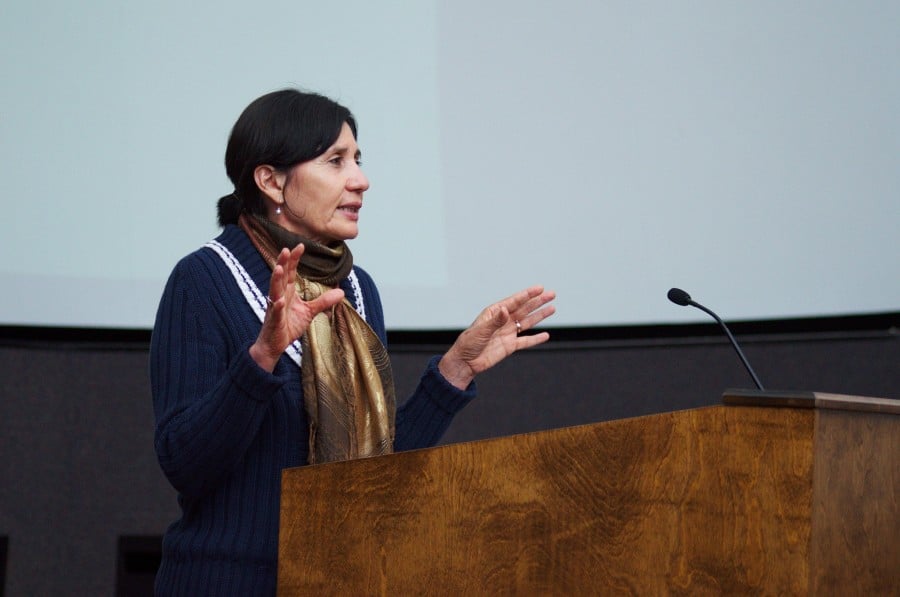In continuation of Hispanic Heritage Month, HUG hosted Macrina Cárdenas Alarcón to speak on Sept. 26. This was a collaborative event with help from the Multicultural Education Department and financial support from women’s, gender and sexuality studies, justice & policy studies, and the history department.
Alarcón is a former delegate for the Mexico Solidarity Movement, but is currently on a speaking tour. While at Guilford, she gave two presentations: “Immigration at the U.S.-Mexico Border” and “Femicides in Ciudad Juarez.”
Immigration at the U.S.-Mexico Border
The issues concerning the U.S.-Mexico border are front-and-center in our current political atmosphere. Alarcón emphasized that the U.S. needs to take responsibility for the serious afflictions Mexicans are facing as a result of our policies. Together with students, teachers, and those in attendance, she discussed things that can be done to make progress in this complex issue.
George Guo, associate professor of political science, thinks everyone should educate themselves about this chain of events.
“If you know the background, foundation, and theory, you’ll be able to interpret the correlations between cause and effect,” said Guo. “Everyone needs to understand policies so in the future we can make a wise decision.”
Understanding policy and how things have happened helps us understand the answers to the serious questions we face.
Jorge Zeballos, Latino community program coordinator, agrees with this concept, which he calls “understanding the larger context.” Understanding the bigger picture allows you to be in the position where you can make a difference. This is significant because right now the next step is taking responsibility and finding ways to help those who our policies have harmed.
“We have our hands in the mess of the issue we’re facing now, we created it,” said Zeballos. “(Yet) all I see is immigrant-bashing. It’s a toxic environment when it comes to immigration right now.”
“What strikes me the most is that we had both hands on Mexico,” said senior Hannah Early. “We were in their economy and in their lives and dictating what they needed to do in regards to economic policy. Now we are trying to remove ourselves from that involvement and act like we haven’t done anything wrong. Part of the reason people cross the border undocumented is because we created a situation in which they need to do so.”
Femicide in Cuidad Juarez
The Mexican city of Cuidad Juarez, located in the region of Chihuahua, is famous for hosting a myriad of crime. However, female victims in particular are becoming a topic of unique discussion.
“Since 1993, about 30 women have been murdered annually in the Juárez metropolitan area of more than two million people,” reports ReVista, Harvard’s Review of Latin America. “Even higher rates of homicide exist among Juárez males: more than 200 men are murdered each year.”
Even though the number of females murdered is significantly less than that of males, these victims have garnered special attention — mainly because, until recently, they have hardly received any attention.
The story of these unnoticed victims, among other issues, has encouraged Alarcón’s work in the Mexico Solidarity Movement.
“Many women (that are) out alone in public disappear and are later found in fields with signs of being attacked,” said Alarcón.
These victims usually show evidence of sexual assault as well.
Women in Cuidad Juarez easily find themselves in vulnerable situations everyday.
“These are where there are free trade zones, there’s a lot of factories, there’s a lot of low wage jobs,” said Assistant Professor of Justice and Policy Studies Sanjay Marwah. “Women are going to work in these factories … they’re single, they don’t know anybody, these are urban, highly dense areas, government officials are considered corrupt.”
In addition to the heinous nature of these crimes, the lack of attention they receive is also a problem. Mexican officials grant this issue little concern, barely investigating cases if not completely ignoring them.

